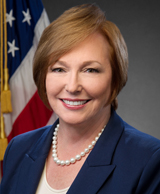
Brenda Fitzgerald, M.D., the head of the Centers for Disease Control and Prevention, resigned today after roughly six months on the job.
In a statement, the Department of Health and Human Services said that newly appointed Secretary Alex Azar accepted Fitzgerald’s resignation, due to her ownership of “certain complex financial interests that have imposed a broad recusal limiting her ability to complete all her duties as CDC director.”
“Due to the nature of these financial interests, Dr. Fitzgerald could not divest from them in a definitive time period,” HHS Spokesman Matt Lloyd said in the announcement. “After advising Secretary Azar of both the status of the financial interests and the scope of her recusal, Dr. Fitzgerald tendered, and the Secretary accepted, her resignation. The Secretary thanks Dr. Brenda Fitzgerald for her service and wishes her the best in all her endeavors."
Fitzgerald was appointed CDC director and the administrator of the Agency for Toxic Substances and Disease Registry on July 7, 2017. A board-certified obstetrician-gynecologist, Fitzgerald served as the commissioner of the Georgia Department of Public Health and state health officer before her appointment to the CDC.
Over the course of her short tenure, Fitzgerald has had to recuse herself from health information technology decisions because of financial holdings in companies that pose a potential conflict of interest. The conflicts concerned Senator Patty Murray, D-Wash., who wrote in a letter that Fitzgerald “cannot perform the role of CDC director while being largely recused from matters pertaining to cancer and opioids.”
On at least three occasions, Murray noted, Fitzgerald sent deputies to testify at Congressional hearings, alongside the heads of other government agencies, that explored the federal response to the opioid crisis.
But it was the revelation by Politico on Tuesday that she purchased shares in Japan Tobacco, which sells tobacco brands in the U.S, through a subsidiary, one month after assuming leadership of the CDC, that likely led to her resignation. The stock was one of several investments Fitzgerald made after taking over the agency, the publication reported, but the tobacco purchase was problematic because it conflicted with CDC’s mission to encourage smokers to quit due to its known health risks.
“You don’t buy tobacco stocks when you are the head of the CDC. It’s ridiculous; it gives a terrible appearance,” Richard Painter, who served as George W. Bush’s chief ethics lawyer from 2005 to 2007, told the publication.